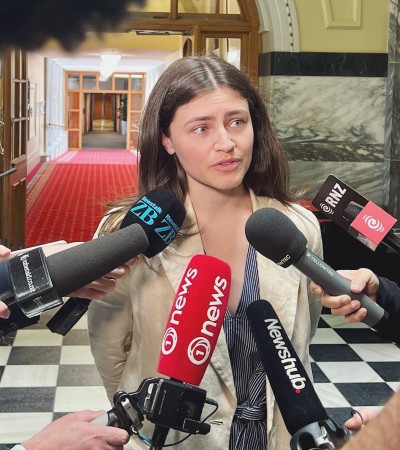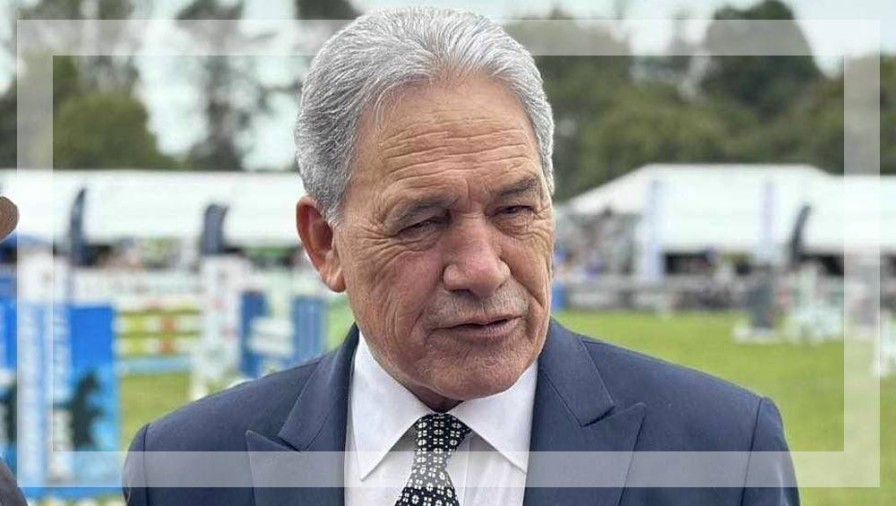Green dilemma, unsafe workplace, the race issue, health woes
Children’s Minister Karen Chhour says she is under constant attack in Parliament.
WATCH: NBR political editor Brent Edwards speaks with Grant Walker.
Children’s Minister Karen Chhour says she is under constant attack in Parliament.
WATCH: NBR political editor Brent Edwards speaks with Grant Walker.
This week’s Beehive Banter starts with a correction and an apology, from NBR presenter Grant Walker.
Walker admits he wrongly predicted that former Green MP Darleen Tana would be gone from Parliament by the end of this week. He was a little premature.
It is now going to take at least until early September before Tana gets her marching orders, if it comes to that.
At its annual meeting over the weekend, the Greens agreed to a tortuous process to consider Tana’s future. Green co-leaders Marama Davidson and Chlöe Swarbrick have written to Tana saying they believe her resignation from the party has affected the proportionality of Parliament. She has 21 days to respond before the co-leaders then write to Parliament’s Speaker Gerry Brownlee to remove her under the Electoral (Integrity) Amendment Act.

Green Party co-leader Chlöe Swarbrick.
But, before it does that, it will open the issue up to all members and hold a special general meeting on September 1 to confirm its decision.
That might not be straightforward. Already three Pasifika Green members Marie Laufiso, Alofa Aiono, and Vasemaca Tavola have resigned over the issue, saying they felt “culturally unsafe” in the party.
Whether their resignations reflect a much broader concern within the party is unclear. But that will become clear on or after September 1.
That special meeting requires a 75% vote for the co-leaders to proceed with writing to Brownlee triggering Tana’s removal from Parliament.
Walker, who was wrong last week, does not believe the Greens will get that vote. If not, that surely would be seen as a vote of no confidence in both Davidson and Swarbrick, who have been clear about the need for Tana to stand down from Parliament.
Even if they get a 75% plus vote it will still be problematic if there is a significant minority – say 20% – who oppose the move.
None of this is good for the Green Party and, in hindsight, it might have been better to have left the decision with Tana alone.

Former Green Party MP Darleen Tana.
Talking about feeling unsafe, Act MP and Children’s Minister Karen Chhour says she is under constant attack in Parliament and no longer feels safe at work.
Chhour is particularly irked by a comment from Te Pāti Māori MP Mariameno Kapa-Kingi that Chhour had been made a puppet by the Act Party.
Tempers are rising as Opposition parties – but Te Pāti Māori in particular – object to government policies they say are undermining Māori.
One of those policies relates to Chhour’s ministerial responsibility for Oranga Tamariki, particularly the Government’s repeal of section 7AA of the Oranga Tamariki Act, which lays out the organisation’s commitments under the Treaty of Waitangi.
In another move, which angered many Māori, the legislation changing the way Māori wards are established passed its third reading this week.
Local Government Minister Simeon Brown says the legislation restores the right of voters to introduce Māori wards on their councils. It will also require those councils that have already set up Māori wards without a referendum to hold a binding poll alongside next year’s local government elections.
Brown says the move restores local democracy and decision-making, but the Labour Party has described it as discriminatory, and Te Pāti Māori called it a “targeted attack on tangata whenua”.

Children’s Minister Karen Chhour feels under attack in Parliament.
It follows a strong speech from Labour leader Chris Hipkins over the weekend criticising the Government’s approach to Māoridom.
Hipkins said that, come 2040, when the country celebrates the 200th anniversary of the signing of the Treaty of Waitangi, the speeches would not praise Prime Minister Christopher Luxon nor honour New Zealand First leader Winston Peters and Act leader David Seymour.
“They will speak about the marches and protests, painting signs and banners calling for the Government to stop its anti-Māori policies. They will recall how it all felt, like they were a problem to be dealt with, a voice to be overpowered, a people to be put in their place.
“How, in 2024, they felt othered by the then National-led coalition Government,” he said.
Peters posted a response on the social media platform X, saying Hipkins’ comments showed how myopic and out of touch his thinking was.
“It puts in neon lights just how siloed his party is in their obsessive echo chamber,” Peters says.
Possibly, but it is clear there are wider concerns about the Government’s Māori policies than just in Labour’s “obsessive echo chamber”.
The debate is likely to get decidedly more pointed when Act’s draft Treaty Principles Bill is finally made public.
One thing is clear, and that is the debate appears to be promoting more division than unity.

New Zealand First leader Winston Peters says Labour is siloed in an ‘obsessive echo chamber’.
Meanwhile, Walker wonders why the media focused so much on Luxon’s claim that there were 14 levels of management between patients and the chief executive of Health New Zealand.
Walker says no-one really cares and that the real story is about the crisis in health care.
But Luxon made the claim more than once, which is why reporters questioned him repeatedly about it when there appeared to be no evidence it was correct. It also raised questions about just how truthful the Government had been about how much it knew, and when, about Health NZ’s financial woes.
The Climate Change Commission delivered its first emissions reduction monitoring report this week, raising concerns upcoming emissions budgets might not be met and urging more needs to be done to cut emissions.
It came the same week Air New Zealand announced it was scrapping its 2030 carbon target because it was too hard.
Yet, despite all the challenges facing the Government, the National Party gets the opportunity to celebrate this weekend when it holds its first annual conference since winning it way back to the Treasury benches.
Luxon says the message he will give to the conference is that this is a Government focused on action and delivery.
“The message will remain unchanged. We are here to turn the country around, we’re here to get it back on track, we’re here to do that by rebuilding the economy – so we kill inflation and lower the cost of living and, importantly, put in place the conditions for future growth, because we’ve got a great country with huge potential and we’ve just got to make sure we do that,” he told his post-Cabinet news conference.
Brent Edwards is NBR’s political editor.
Sign up to get the latest stories and insights delivered to your inbox – free, every day.